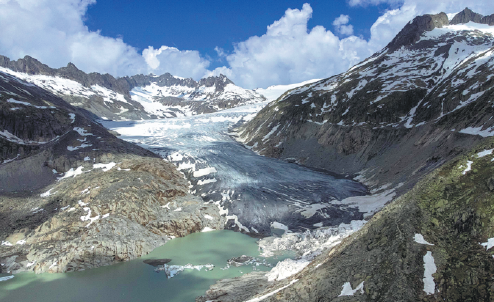Europe is fastest-warming continent

PARIS — Europe is the fastest-warming continent as it endured a record number of "extreme heat stress" days last year, two leading climate monitors said on Monday, emphasizing the threat of increasingly deadly summers across the continent.
In a year of contrasting extremes, Europe witnessed scorching heat waves but also catastrophic flooding, withering droughts, violent storms and its largest wildfire.
These disasters inflicted billions of dollars in damages and affected more than 2 million people, the European Union's Copernicus Climate Change Service and the United Nations' World Meteorological Organization said in a joint report.
The consequences for health were particularly acute, with heat singled out by these agencies as the biggest climate-related threat as global warming drives ever-hotter European summers.
"We're seeing an increasing trend in the number of days with heat stress across Europe and 2023 was no exception, with Europe seeing a record number of days with extreme heat stress," said Rebecca Emerton, a climate scientist at Copernicus.
Heat stress measures the effect that the environment has on the human body, combining factors such as temperature, humidity and the body's response to establish a "feels like" temperature.
Last year, parts of Spain, France, Italy and Greece experienced up to 10 days of extreme heat stress, defined as a "feels like" temperature of more than 46 C, at which point immediate action must be taken to avoid heat stroke and other health issues.
Health risks
Extreme heat poses particular health risks to outdoor workers, the elderly and people with existing conditions such as cardiovascular diseases and diabetes.
Twenty-three of the 30 worst heat waves on record in Europe have occurred this century and heat-related deaths have soared around 30 percent in the past 20 years, the report said.
Parts of Italy recorded 7 percent more deaths than normal in July, with victims including a 44-year-old man painting road markings in the northern town of Lodi who collapsed and died.
The latest five-year averages show that temperatures in Europe are now running 2.3 degrees above preindustrial levels — twice as fast as the global average — and heat waves will become longer and more powerful in future, the report said.
This, coupled with aging populations and more people moving to cities, will have "serious consequences for public health", it added.
"Current heat wave interventions will soon be insufficient to deal with the expected heat-related health burden," it said.
Average sea surface temperatures in Europe were the warmest on record, the report said, with a severe marine heat wave in part of the Atlantic Ocean described as "beyond extreme".
Glaciers in all parts of Europe saw a loss of ice, while Greece suffered the largest wildfire in the history of the EU.
Agencies Via Xinhua

Today's Top News
- Israel's Gaza takeover plan widely condemned
- S. Korea visa waiver spurs surge in travel interest
- Top cities signal easing to support property market
- Ties bolster heritage protection
- Gaza 'takeover' will ignite another horrific chapter for the Middle East: China Daily editorial
- STAR shines for innovative companies






























